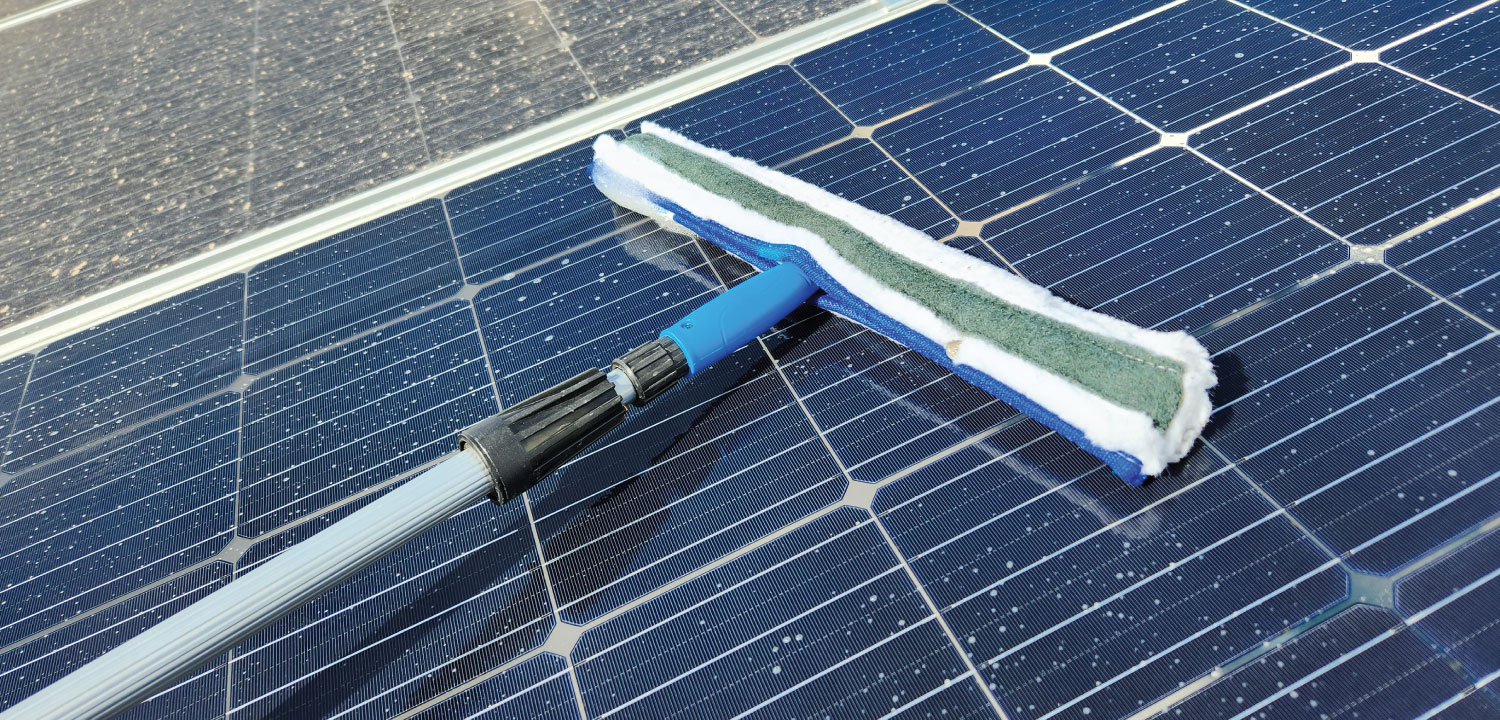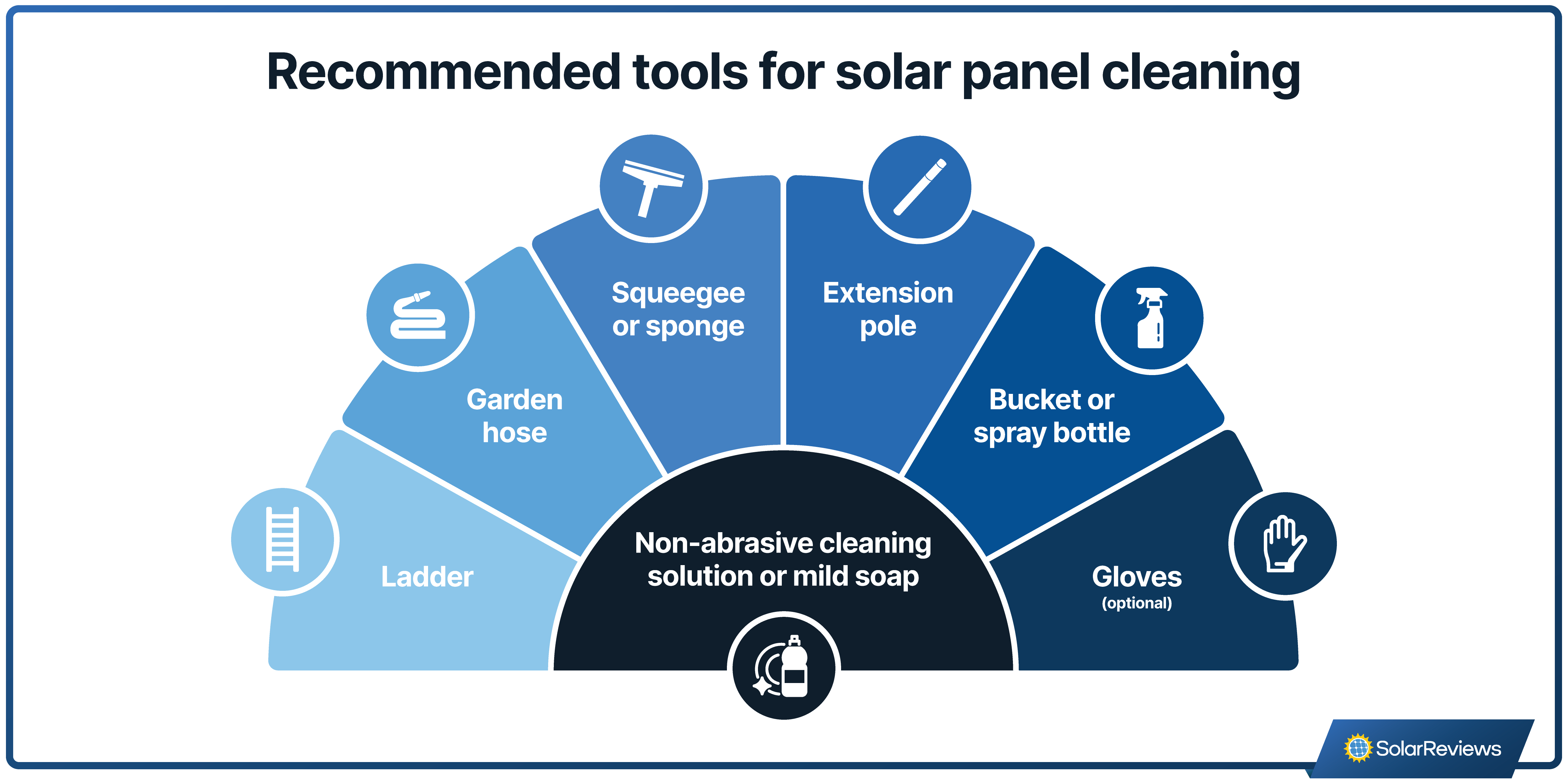Updated 1 year ago
Solar panel cleaning: Everything you need to know
Written by
Jamie Smith

Find out how much energy solar panels can produce on your roof
One of the greatest benefits of having solar panels is that they don’t require much maintenance after you install them. However, solar panels are constantly exposed to outside elements and weather conditions while on your roof.
Routine cleanings are an easy way to keep your panels performing at their very best!
Watch our video with solar expert Ben Zientara for more information about cleaning solar panels!
Key takeaways
-
Solar panels require very little maintenance, but cleaning them twice a year can be necessary for optimal solar energy output.
-
Companies typically charge $5 to $15 per panel for solar panel cleaning services.
-
Not cleaning your solar panels can lower your solar savings by $79 per year, on average.
-
You can clean solar panels yourself in a few simple steps or seek out a cleaning company that can do it for you.
How to clean solar panels
Like anything you keep outside, solar panels can get covered in dirt, dust, and debris. Rainfall usually removes most of that, but regular intentional cleanings will keep your system in top shape!
Luckily, it’s pretty easy to clean solar panels yourself! Listed below are some recommended tools you’ll most likely need for solar panel cleaning:

Step 1: Check for cleaning recommendations
Before you get up on the roof and start cleaning, it’s important to check for specific cleaning instructions from your solar panel manufacturer. Certain solar panel modules are crafted differently and might require specific care.
Cleaning instructions are usually listed in an owner's or installation manual, typically found on a manufacturer’s website. These manuals may contain recommended cleaning methods or products to ensure the panels aren’t damaged.
Step 2: Pick a safe time to clean
Solar panels can get incredibly hot in the sunshine – so we don’t recommend trying to clean them off during days when temperatures are high, like hot summer months.
It’s safe to clean them off on a relatively cool day or early morning and afternoon when the sun isn’t as intense.
Step 3: Rinse your panels
Depending on the severity of the buildup on your panels, they may just need a simple hose down. Use a garden hose to rinse your panels to see if this removes the dirt.
Avoid using a pressure washer to clean your panels. The intense pressure can potentially damage your panels, even breaking the framing’s seal and getting water inside of it!
Step 4: Fill a bucket with water and soap
This one’s self-explanatory – grab a large bucket and fill it with warm water and a mild or non-abrasive cleaning solution or soap. You may need a glass cleaner spray, depending on the panel cleaning instructions.
Step 5: Clean the surface of your panels
For more stubborn buildup, like bird droppings or heavy pollen, you can scrub them off of the glass surface with a squeegee or sponge attached to an extension pole. The extension pole is recommended to make the cleaning process easier.
When cleaning your solar panel system, you do not need to worry about the wiring underneath them; wiping down the surface of the panels will do!
Heads up! Cleaning your solar panels yourself requires you to climb up on your roof. Be sure to do so with extreme caution. Consider consulting professional solar panel cleaners to do the job if you’re not sure you can perform the task safely.
How much does it cost to clean solar panels?
Professional solar planning cleaning companies typically charge between $5 and $15 per panel. So, if you have 20 solar panels on your roof, it would cost somewhere between $100 and $300 to have the panels professionally cleaned.
If you clean your panels yourself, you’ll likely spend around $100 for the materials needed for cleaning. Your biggest expense would likely be a reliable ladder if you don’t already own one.
The price to hire a cleaning service is different everywhere and may vary with the design and complexity of your system – just expect to pay a bit more when choosing a company to clean your panels instead of doing it yourself.
Should I hire someone to clean my solar panels?
Hiring a professional is often recommended for solar panel cleaning to eliminate the risk of any injury. Seeking out a solar panel cleaning service is a viable option for homeowners to do regular maintenance on their panels. It also prevents you from accidentally damaging your panels in the process.
Cleaning companies are widely available, so you shouldn’t have an issue contacting one. There are companies that cater specifically to solar panels, but it’s common for window-washing companies to offer services for solar panel cleanings.
Your solar panel installer might even have local recommendations for solar panel cleanings, or may offer the services themselves!
Avoid power washers. The high pressure of power washers can potentially damage the panel’s surface or loosen the framing’s seal, causing water to get inside the panel and prevent it from working.
Why should I clean my solar panels?
Having solar panels that are excessively dirty can restrict their access to direct sunlight – resulting in lower efficiency levels and energy production.
Basically, dirty solar panels mean lower electricity bill savings! On average, not cleaning your solar panels can reduce your lifetime solar savings by almost $2,000.
If you want optimal results for your home solar’s energy output, cleaning your solar panels is highly recommended.
How often do I need to clean my solar panels?
Cleaning your solar panels once or twice a year is enough in most areas. However, in some places, solar panels could require some extra attention.
For example, if you live in the southwest region of the U.S., where rainfall is limited, the accumulation of dirt, dust, and grime can be far greater, calling for extra care.
If you live in an area with a lot of wildlife activity, your panels may become soiled more quickly by things like bird droppings, and animals can next under solar panels as well. Consider solar critter guards if that is an issue that use face.
Also, take into account the angle at which your panels are installed. Rainwater and debris can easily wash away dust and debris on solar panels at a steeper angle. If you have a flat roof with solar panels or your system is at a reduced angle, you might want to clean them more often.
Is cleaning my solar panels worth it?
In short - yes!
Regular cleanings are just about the extent of solar panel maintenance, and they’re incredibly beneficial to your solar panel efficiency and energy output. Heavy neglect can affect solar panel performance and the savings on your monthly electric bills.
Cleaning solar panels yourself is relatively easy and cheap but can be dangerous. Make sure you take the correct safety precautions before going on your roof. Consulting with a professional cleaning service might be a bit more costly, but you’ll get great results without the risk!
Jamie is a content writer and researcher with a B.S. in Communications from La Salle University, where she focused on journalism, mass media, and public relations. As a former member of the SolarReviews editorial team, she created content to help homeowners better understand solar energy and make informed decisions. Prior to joining SolarReviews, she worked at a marketing company producing long-form stories and interviews that highlighted small ...
Learn more about Jamie Smith